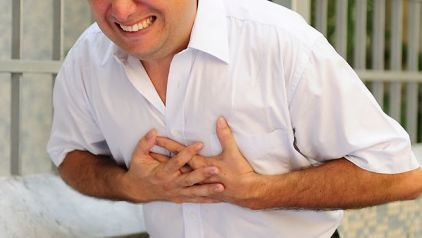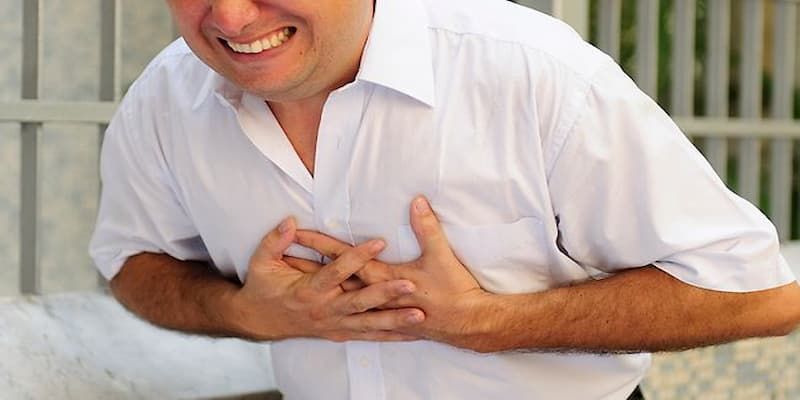A heart attack is a medical emergency. Here are some of the information regarding heart attack factors and symptoms as explained by Red Cover Life Planning.
This illness is listed as a Critical Illness by AIA. It is covered in the AIA Critical Illness Plans. Click here to go to the AIA Critical Illness Plans page for coverage details.
A heart attack is a severe medical crisis in which the supply of blood to the heart is suddenly blocked, usually by a blood clot. A lack of blood going to the heart may dangerously weaken the heart muscle and can be life-threatening.
Heart Attack Factors and Symptoms
A heart attack is an emergency case in which the supply of blood to the heart becomes blocked. This situation is often seen as the effect of a blood clot. There are other terms used for a heart attack including myocardial infarction, cardiac infarction, and coronary thrombosis. The myocardial infarction and cardiac infarction are when the blood supply to an area is cut, and the tissue in that area dies.
What is the difference between a heart attack and a cardiac arrest? A heart attack is the blockage of an artery leading to the heart, and a cardiac arrest involves the heart to stop pumping the blood to the body.
Symptoms of a heart attack can include:
- chest pain
- shortness of breath
- feeling weak
- lightheaded
- the overwhelming feeling of anxiety
Not everyone will experience severe chest pain; the pain can often be mild and mistaken for indigestion. It’s the combination of heart attack factors and symptoms that are related to determining whether a person is having a heart attack and not the severity of chest pain.

Why people have heart attack
A heart attack happens when one or more of your coronary arteries is blocked. After some time, a coronary artery can narrow from the development of different substances, including cholesterol. This condition, known as coronary artery disease, causes the most heart attack.
- Previous heart attack.
- Diet – for example, consuming large quantities of saturated fats.
- HIV – people who are HIV-positive have a 50 percent higher risk.
- High cholesterol levels – increase the chance of blood clots in the arteries.
- Diabetes – insulin, a hormone covered by your pancreas, allows your body to use a form of sugar; glucose. Having diabetes — not producing enough insulin — causes your body’s blood sugar levels to increase. Diabetes, especially uncontrolled, increases your danger of a heart attack.
- Obesity – obesity is associated with high blood cholesterol levels, high blood pressure and diabetes. However, losing just 10 percent of your body weight can lower this risk.
- Hypertension – also known as high blood pressure.
- Genetics – if your siblings, parents or grandparents have had early heart attacks (by age 55 for male relatives and by age 65 for female relatives), you may be at increased risk.
- Age – men age 45 or older and women age 55 or older are more likely to have a heart attack than are younger men and women.
- Smoking – smoking and long-term exposure to secondhand smoke increase the risk of a heart attack.
- Stress – you may respond to stress in ways that can increase your risk of a heart attack.
How do doctors treat heart attack
The quicker someone is treated when having a heart attack, the greater the chances of success. These days, most heart attacks can be dealt with effectively. However, it is crucial to remember that a person’s survival depends largely on how quickly they reach the hospital.
Sometimes, a person who is having a heart attack will stop breathing. In this case, cardio-pulmonary resuscitation, or CPR, should be started immediately. This process involves manual chest compressions and a defibrillator.
With each passing minute after a heart attack, more heart tissue loses oxygen and deteriorates or dies. The main way to prevent heart damage is to restore blood flow quickly.
Medications
Medications given to treat a heart attack include:
Aspirin
Emergency medical personnel may give you aspirin immediately. Aspirin helps to reduces blood clotting, thus maintain blood flow through a narrowed artery.
Thrombolytics
Thrombolytics is also called clot busters, help dissolve a blood clot that’s blocking blood flow to your heart. The earlier you receive a thrombolytic drug after a heart attack, the higher the chance you’ll survive and with less heart damage.
Antiplatelet agents
Doctors may give you other drugs to prevent new clots and keep existing clots from getting larger. These include medications, such as clopidogrel (Plavix) and others, called platelet aggregation inhibitors.
Other blood-thinning medications
You’ll likely be given other medications such as heparin. Heparin helps to make your blood less “sticky” and less likely to form clots. It is given intravenously or by an injection under your skin.
Pain relievers
You may receive a pain reliever, such as morphine, to ease your discomfort.
Nitroglycerin
Nitroglycerin is used to treat chest pain. It can help improve blood flow to the heart by widening the blood vessels.
Beta blockers
This help to relax your heart muscle, slow your heartbeat and decrease blood pressure. Beta blockers can limit the amount of heart muscle damage and prevent heart attacks in the future.
ACE inhibitors
It helps to lower blood pressure and reduces stress on the heart.
Surgical and other procedures
In addition to medications, you may undergo one of the following procedures to treat your heart attack:Z
Coronary angioplasty and stenting.
Doctors insert a long, thin tube (catheter), usually in your leg or groin, to the blocked artery located in your heart. This procedure is often done right away when you have a heart attack after cardiac catheterization. Cardiac catheterization is a procedure used to locate blockages. This tube is equipped with a specific balloon that is inflated to open a blocked coronary artery. A metal mesh stent may be inserted into the artery. This step is done to keep it open for a long-term, restoring blood flow to the heart. Depending on your condition, your doctor may opt to place a stent coated with a slow-releasing medication to help keep your artery open.Z
Coronary artery bypass surgery
In some of heart attack cases, doctors may perform emergency bypass surgery at the time of a heart attack. Bypass surgery involves sewing veins or arteries in place beyond a blocked or narrowed artery. This surgery helps in allowing blood flow to the heart to bypass the narrowed section.
Once blood flow to your heart is restored and your condition is stable, you’re likely to remain in the hospital for several days.
How much does it cost to treat heart attack
Heart attack or heart disease itself can affect more than your health. It can have an impact on your finances, too. There are immediate charges that you need to pay, after a heart attack. As an example, ambulance service, diagnostic tests, doctor’s facility charges, hospital charges and possible surgery. If you’re healthy now, getting an insurance plan could be a brilliant idea. With insurance, you can rearrange some of your lost income if you ever become disabled by heart disease or another health condition and can’t work. One of the ways to know the overall cost of this treatment is best to check with the hospital.
Who can help you with this cost
Financial Security – It is There When Needed
Levine can help you to protect yourself and the future of your loved ones. Get immediate financial security. Don’t touch your savings. Let insurance provide it.
She can help provide financial security in times of hardship and will be able to ease the financial burden of your dependents in your absence.
Contact our AIA INSURANCE AGENT LEVINE LEE to get in touch with us and start your personal coverage, group coverage or choose your plan now. Get covered correctly. Be advised correctly. Call Levine Lee (+6012-684 0948) today to be advised on the best insurance protection personalized for you. Or send us the form below on your interest.








